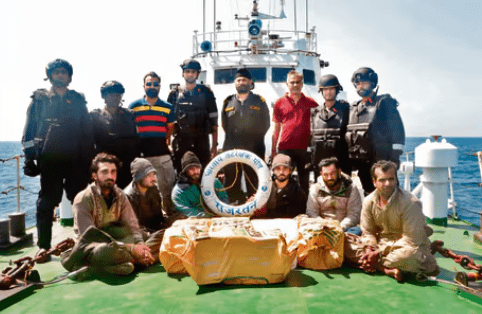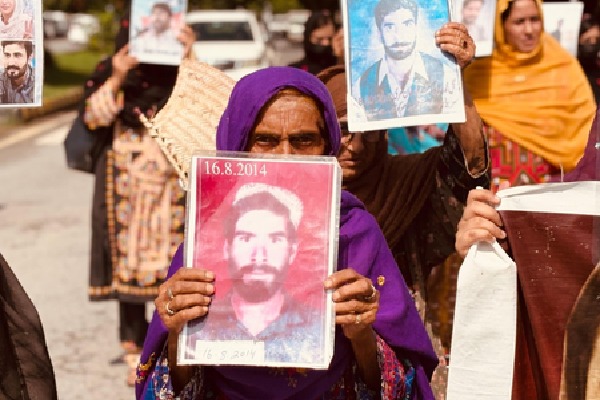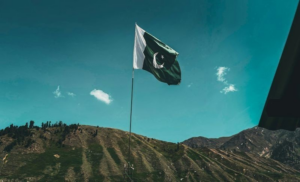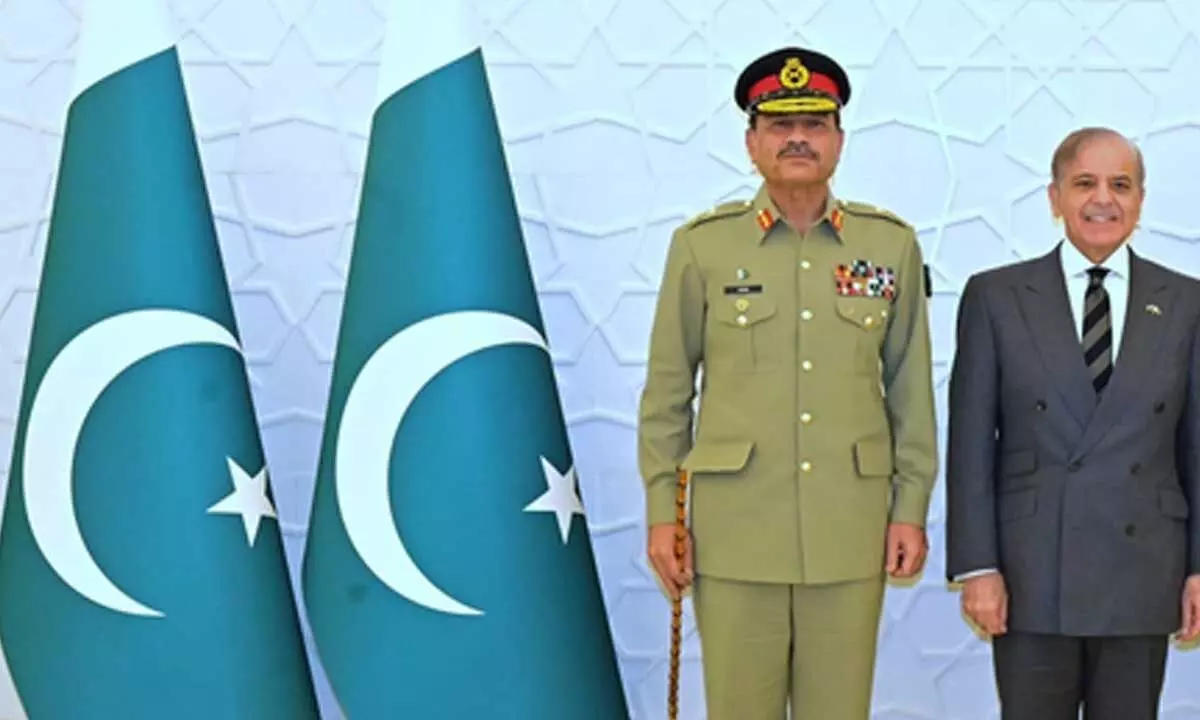
They were the perfect patsies — born at the coast near Pakistan’s Gwadar port, condemned to be fishermen but living lives of mounting debt, many battling gambling addictions. They knew their lives were in danger; but they did not care. On March 11, six Pakistani men, mules for the Haji Salim cartel, set off from Gwadar in Pakistan, their boat loaded with 62kg of methamphetamine. A day later, they were surrounded and captured by a joint team of the Narcotics Control Bureau (NCB), the Indian Coast Guard and the Gujarat ATS. It wasn’t the first time this year that such a capture had been made.
On March 12, six Pakistani men, mules for the Haji Salim cartel, were captured by a joint team of the Narcotics Control Bureau (NCB), the Indian Coast Guard and the Gujarat ATS near the Gujarat coast. (Indian Coast Guard)
On March 12, six Pakistani men, mules for the Haji Salim cartel, were captured by a joint team of the Narcotics Control Bureau (NCB), the Indian Coast Guard and the Gujarat ATS near the Gujarat coast. (Indian Coast Guard)
The arrests and seizures have laid bare one of the Arabian Sea’s worst kept secrets. That from the shores of Pakistan, boats criss-cross the choppy waters, delivering their illegal consignments to accomplices waiting in India. But what the arrests have also done, NCB and Gujarat Police officials HT spoke to at length said, is give them an understanding of the modus operandi – a network built on code words, desperation, and surgical precision.
The modus operandi
On the morning of March 11, when 27-year-old Mohammad Ayaz of Kolachi Mohallah in Pasni, Gwadar, set sail for India, all he carried along was a Thuraya handset (a satellite phone), a VHF radio, and two code words that he muttered to himself so as not to forget. “Dariya” (river) and “Badshah”(emperor).
Sometime before they were to set off, the consignment was loaded on the boat. Ayaz has told interrogators he knew it was drugs, but he wasn’t sure which. It could have been anything – heroin, methamphetamine or hashish. “He has said he did not know what drugs were concealed in packets of coffee beans. But it didn’t matter. Because he knew he would be behind bars in an Indian prison if he was caught. This did not stop him. He had made the journey before,” an NCB officer said.
A handler who only spoke to him over the Thuraya satellite phone and is likely based in Duba gave Ayaz the two code words, to be spoken to receivers when they reached specific coordinates near Porbandar. “If Ayaz said ‘Dariya’, the receiver would have to say – ‘Dariya khoobsurat hai’ (the river is beautiful). If Ayaz said ‘Badshah’, the receiver had to say ‘Badshah salamat hai’ (the king is safe). There are hundreds or thousands of boats in the sea. Sometimes identifying the boat at the decided location is difficult so code words ensure that the consignment reaches the correct person and not to a mole or an informant,” the NCB officer added.
The carriers have no other identification; no cellphones, no identification papers. “Once these carriers leave Pakistan, they are only in touch with their handler. Even during the journey, the handlers change the coordinates multiple times. This is the cartel’s way of taking precautions,” the officer said.
The mules
One question facing Indian investigators is why people from Pakistan’s Gwadar port would risk their lives for an operation fraught with risk. The answer, investigators have now found, is as old as time – poverty. The six arrested men have said that there are recruiters who visit the Gwadar port every week looking for a particular kind of person. Someone with debt and a large family to feed. Someone facing an existential crisis will find the gumption to enter Indian waters with drugs.
All six of those arrested, Ayaz and Zubair Ahmed (24), Mutalib Khan (22), Bahar Ali (22), Andaz Lala (19) and Mohsin Hussain (40), are l residents of Gwadar’s Pasni. They are all fishermen who earn a living by looking for catch near the Gulf of Oman. “If the catch is good, each fisherman makes a profit of around ₹2,000 from one trip. A trip could last from four days to a week. They go in groups of 4-5, so they share the profit. With profits in the fishing business no longer what it used to be, fishermen like Ayaz are ready to carry drugs or do any job that involves boats and water,” a second NCB officer said.
Andaz Lala has told investigators, the officials said, that most men at the Gwadar port have addictions that range from gambling to a particular brand of tobacco. Prime facie enquiries have revealed that the six men were promised ₹50,000 for a three day journey from Pakistan to India and then back. They were also told that all the leftover diesel in unused barrels would be theirs to share upon return. “In last month’s operation, where the joint agencies seized over 3,000kg hashish the fishermen were paid between ₹1-2 lakh. In the latest case, it is possible that there were many fishermen who took the drugs off from a ‘mothership’ and were bringing it to Indian waters in smaller quantities,” the second officer added.
The men who run the operation
At the centre of it all is the 40-year-old Haji Salim, the Karachi-based underworld kingpin who sits at the top of a vast network that sends drugs into India.
Central intelligence agencies suspect that Salim is responsible for smuggling 70% of the drugs that come to the country. Apart from Pakistan, Salim has methamphetamine laboratories in Balochistan and areas around the Pakistan-Iran border. Delhi Police and central agencies suspect that he also has contacts in Pakistan’s Inter-Services Intelligence (ISI) and the Lashkar-e-Taiba.
“The net worth of the drugs he smuggles runs into thousands of crores. We suspect drug money is also used in terror activities. Every month the BSF recovers dozens of drugs from the Jakhau coast in Gujarat, which flows to the coast after they are dumped by his men on seeing Navy and Coast Guard personnel,” said a Gujarat ATS officer who asked not to be named.
Running the business for Salim are people such as Ayaz, called “tandels” – a word used to refer to the chief fisherman or the ship’s captain. These tandels largely build their own team to carry out the operations, a group of men they trust implicitly, often experienced. Ayaz, for instance, had made the trip four times before. “There are hundreds of poor fishermen used by the cartel. Most times even the fishermen at port are unaware which boat is taking the drugs. The profit margin of selling heroin or hashish from Pakistan and Afghanistan is so high that these cartels send consignments every week. Even if one consignment successfully lands in India or Maldives or Sri Lanka, the profits they make will cover the losses,” said NCB assistant director Sagar Kaushik, who is the investigating officer in both cases.
A Gujarat ATS officer explained how it is difficult to identify boats in the Arabian sea. “There are thousands of boats, big and small, in the water. Unlike operations on land, it is difficult to stop every boat and search it. Our operations are based on intelligence inputs and finding moles. When you are in the sea it is difficult to zero in on the boat carrying the drug. This is why smugglers sometimes managed to exchange drugs mid-sea. But they are cautious now because of the record seizures that the agencies are making.”
Of the eight Pakistan nationals arrested in the last two operations, only one who brought over 3000kg hashish on February 27 claimed to have spoken directly to Salim. But there is an open secret they have all confirmed – Salim’s methamphetamine laboratories along Gwadar port.
“Salim has a separate team that works at his methamphetamine laboratories. The drugs sent by Salim’s cartel are usually packed in coffee bean packets, or rice bags with the words – Afghanistan 999 or 555 Rice. They are also concealed in jute bags with the names, Al Faisal Rice or Shaheen Rice, produce of Pakistan. When we ask these fishermen whose consignment there were carrying, they confess — it belongs to Haji Saab,” the second NCB officer said.
NCB’s director general, SN Pradhan in a joint press conference with Indian Navy and Gujarat ATS officials on February 28 said that the smuggling of drugs in bulk via the sea is one of the many ways to destabilise India. “With a sense of responsibility as DG of NCB, I can say that it is part of a grand design to try and destablise the country’s by sending drugs into the subcontinent,” he said.
Gyaneshwar Singh, deputy director general (operations) at NCB, said the agency is coordinating with other agencies and keeping a strict vigil on the sea route. “We are working with Indian Navy, Indian Coast Guard and Gujarat police to ensure that drugs are not smuggled to India. We are on high alert also because of the forthcoming elections. All agencies have come on board to achieve the Prime Minister’s vision of a drug-free Bharat.”
Importantly, they now know what to look for.






